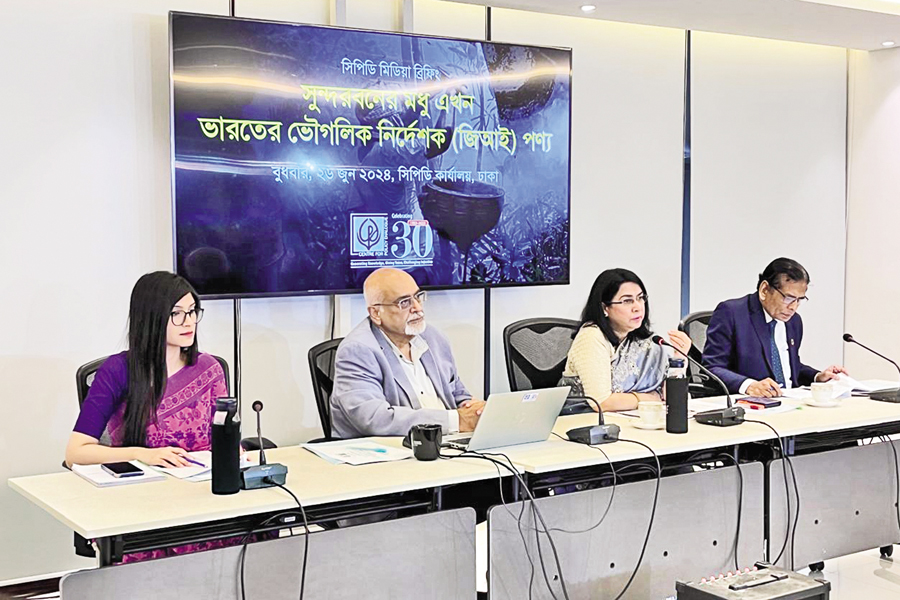
Published :
Updated :

Negligence by the Bangladeshi administration has allowed honey collected from the Sundarbans to be recognised as a Geographical Indication (GI) product of India, according to the Centre for Policy Dialogue (CPD).
Sundarbans honey was recently presented as an Indian GI product at a World Intellectual Property Organization (WIPO) conference. The West Bengal Forest Department claimed sole production of Sundarbans honey.
This is the tenth shared GI product that India has registered as its own, according to CPD, as it warned that more registrations were in progress.

"In August 2017, the Bagerhat deputy commissioner wrote to the Industries Ministry requesting registration of Sundarbans honey as a Bangladeshi GI product," said CPD Distinguished Fellow Dr Debapriya Bhattacharya at a press conference at the CPD office in Dhaka on Wednesday.
"However, registration remains outstanding. The blame lies squarely with our administration," said the economist.
"While Bangladesh is the primary extractor of Sundarbans honey, India applied for and secured the GI tag in January this year, despite most of the Sundarbans being in Bangladesh," Dr Debapriya added.
A CPD presentation showed that two-thirds of the honey is collected from the Bangladeshi side of the Sundarbans, with India collecting a comparatively smaller amount from the world's largest mangrove forest.
"Therefore, Bangladesh has the rightful claim to Sundarbans honey as a GI product," Dr Debapriya said.
He compared this situation to the loss of the Tangail Jamdani saree's GI tag to India.
For the losses, the economist blamed a lack of skills, capabilities and accountability within Bangladeshi government institutions.
CPD Executive Director Fahmida Khatun pointed the finger at insufficient policy action for the loss of GI recognition of traditional Bangladeshi products.
A Geographical Indication (GI) is a name or symbol used on specific products to certify their qualities, which are linked to the environment, climate and culture of a particular location. This certification helps with branding, promotes traditions and reputations in the global market, and creates a distinct demand for the product.
"Without GI registration for our products, we cannot claim the traditional ownership. If we fail to register them, others will," Fahmida Khatun said.
GI registration paves the way for commercial production, marketing rights and legal protection. GI-tagged products typically command higher prices compared to similar products from other countries.
"We only wake up from the slumber when another country takes action," Fahmida Khatun concluded.
For shared products like Sundarbans honey, Dr Debapriya Bhattacharya at the press conference advocated for a collaborative approach between Bangladesh and India, which could benefit both nations.
He also urged the government to join the EU's Regional Agreement and the Geneva Act of the Lisbon Agreement-2015 to facilitate joint GI applications.
Weak IP laws deter foreign investment
According to CPD, intellectual property protection is crucial for attracting foreign investment and technology.
Dr Debapriya Bhattacharya argued that weak enforcement of intellectual property laws is a major reason for low foreign investment in the country.
He questioned the current system for protecting products developed by Bangladesh's many freelance app developers and creators.
"Protection of intellectual property (IP) rights and enforcement of related laws are crucial for the economy," Dr Debapriya said. "Strong IP rights play a role in attracting foreign investors and creating a positive environment for expanding export markets."
Currently, the world's largest companies are giving special importance to intellectual property law in terms of investment, he noted.
The conference was also attended by CPD Distinguished Fellow Mustafizur Rahman.
bdsmile@gmail.com


 For all latest news, follow The Financial Express Google News channel.
For all latest news, follow The Financial Express Google News channel.